On path to peace: Cui
Updated: 2015-09-04 01:00
By CHEN WEIHUA in Washington(China Daily USA)
|
||||||||
China’s top envoy to the United States has reiterated his country’s commitment to peaceful development a day ahead of a major military parade in Beijing.
In an op-ed posted on the USA Today website Wednesday afternoon, Cui Tiankai, the Chinese ambassador to the US, said some people are suspicious that China is trying to challenge the current international order and US global leadership and believe that such attempts will inevitably lead to conflict, or even war.
“Yet the simple fact is that China has achieved remarkable growth by committing to the peaceful development path, carrying out reform and opening up,” Cui wrote.
The career diplomat, who was a vice-foreign minister before assuming the current post in April of 2013, said China benefits from the current international order and has been the guardian of such order.
“Being an irrational challenger does not serve its interests,” wrote Cui, a graduate of Johns Hopkins University’s Paul H. Nitze School of Advanced International Studies.
He described the Asian Infrastructure Investment Bank (AIIB) as one of the efforts made by China to complement the World Bank and other regional development banks, not to challenge them. “We welcome US participation,” Cui said.
The AIIB, initiated by China, has 57 prospective founding members and is welcomed by IMF, the World Bank and Asian Development Bank.
The US had long expressed suspicion of the new institution but has in the past few months voiced cautious support after receiving much criticism at home.
The ambassador said differences between China and the US have neither undermined their shared international responsibilities nor hindered their cooperation in various areas.
“We should look beyond our differences, stay committed to the core values and the major framework of the post-war international order, and steadfastly reject behaviors that challenge them,” he wrote.
Cui believes that China and the US should leverage their respective advantages to explore new measures to enhance cooperation in global governance. “So far, we have tremendous achievements, such as tackling climate change and the Ebola epidemic,” he wrote.
In his weekly address on climate change on Aug 29, Obama cited the ambitious climate targets set by the US and China during his visit to Beijing last November as “leading by example.”
US Secretary of State John Kerry has also on several occasions praised China’s contribution in fighting the Ebola outbreak in West Africa.
Cui said President Xi and President Obama will have an opportunity to share their visions on the international order later this month during Xi’s state visit to the US.
According to the ambassador, the world is undergoing a profound change. Globalization has deepened ties between countries. A number of developing countries, including China, are offering more public goods to the international community with growing capabilities.
Meanwhile, the international community is faced with many challenges — such as terrorism, climate change, financial risks, extreme poverty and natural disasters — that require better coordination, according to Cui.
“While the framework of the current international order should remain stable, it is important to adapt to the changing situation. Gradual reforms and adjustments should be introduced through inclusive consultations,” he wrote.
Cui described the Sept 3 commemorative event in Beijing for the victory over fascism as aiming not only to remember those who sacrificed everything, but also to celebrate the triumph of good over evil, honoring China, the US and all peace-loving countries.
“We will never forget that China and the US were allies fighting side by side, and will be forever grateful for the contributions made by the US in supporting China’s resistance against Japanese aggression,” he wrote.
The victory of 1945 laid the foundation for today’s international order. The charter of the United Nations, born among the ruins of World War II, raised a series of important principles governing current international relations, such as sovereign equality, collective security, international cooperation and common development, according to Cui.
“These shared values will never be outdated. They still play a central role in maintaining international order. Since World War II, despite the Cold War and some regional conflicts, the trend toward peace and development has remained strong, with the UN and many other international mechanisms playing greater roles in world affairs,” he wrote.
The ambassador described a WWII photo on display in the central hall of the Chinese embassy in Washington in which a young American soldier and a Chinese boy are crouched in the trenches holding two pigeons in their hands. Above the photo are these words: For Justice and Peace.
“The photo touches our hearts because it is a testament to the history created by Chinese and American people together. In history’s deadliest war, people of different nations united to defeat the fascist forces with immeasurable cost of life and property. While hatred faded away, we should not forget that peace and justice are never free,” he wrote.
“The young American soldier in the photo may never know that his friendship with a little boy in a remote Chinese village can transcend time and distance. Just like we did 70 years ago, China and the US, together with other members of the international community, should and will continue to maintain and improve the international order,” Cui wrote.
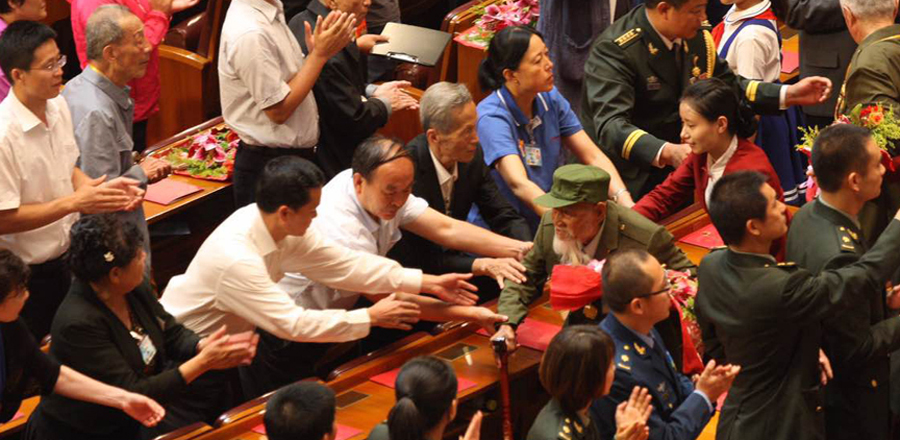
 Veterans attend V-Day anniversary gala show
Veterans attend V-Day anniversary gala show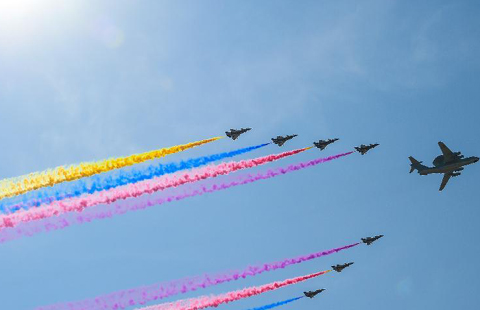
 Military helicopters write number 70 high in the sky
Military helicopters write number 70 high in the sky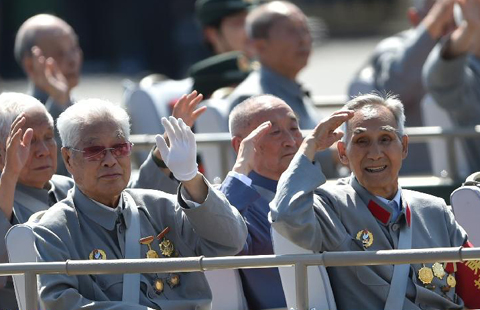
 Salute to veterans
Salute to veterans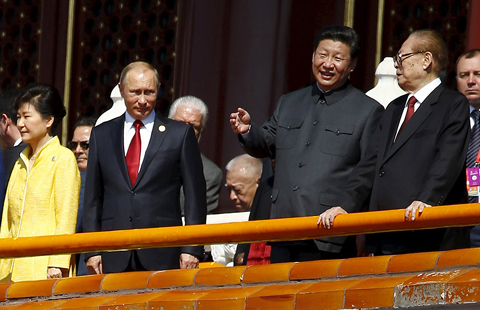
 Xi attends the ceremony with other leaders
Xi attends the ceremony with other leaders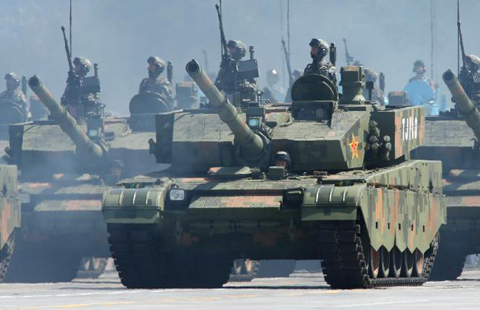
 Armored vehicles roll down the parade in huge roar
Armored vehicles roll down the parade in huge roar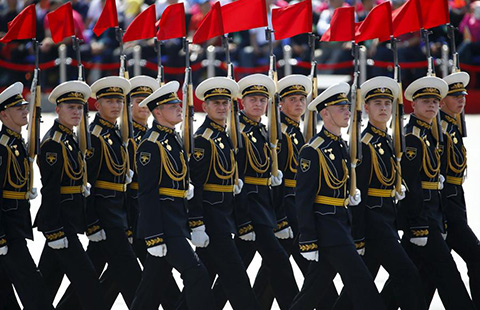
 Foreign troops celebrate with Chinese comrades
Foreign troops celebrate with Chinese comrades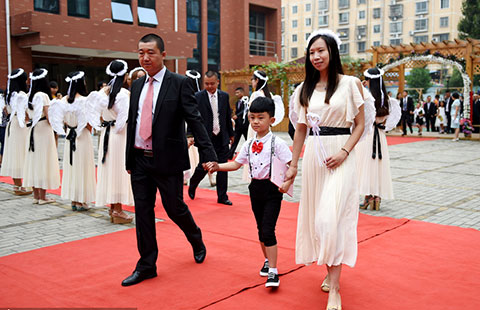
 Red carpet ceremony for first grade kids
Red carpet ceremony for first grade kids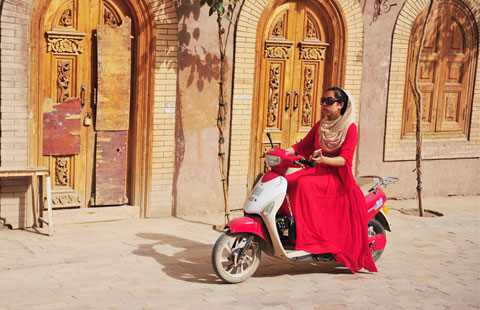
 Kashgar old city in Xinjiang is well preserved
Kashgar old city in Xinjiang is well preserved
Most Viewed
Editor's Picks

|

|

|

|

|

|
Today's Top News
Intl community echoes Xi's speech at V-Day commemoration
Envoy hails New York resolutions
Nation's military power grows but still trails behind
China to cut troops by 300,000: President Xi
Springfield gets Chinese railcar plant
On path to peace: Cui
15 US cities make world’s ‘least friendly’ list while China places 3
Xi heralds V-Day with troop cuts at parade
US Weekly

|

|







